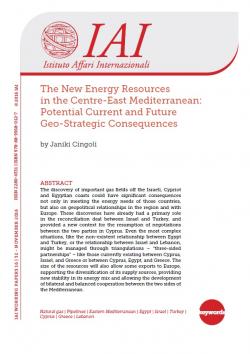The New Energy Resources in the Centre-East Mediterranean: Potential Current and Future Geo-Strategic Consequences
The discovery of important gas fields off the Israeli, Cypriot and Egyptian coasts could have significant consequences not only in meeting the energy needs of those countries, but also on geopolitical relationships in the region and with Europe. These discoveries have already had a primary role in the reconciliation deal between Israel and Turkey, and provided a new context for the resumption of negotiations between the two parties in Cyprus. Even the most complex situations, like the non-existent relationship between Egypt and Turkey, or the relationship between Israel and Lebanon, might be managed through triangulations – “three-sided partnerships” – like those currently existing between Cyprus, Israel, and Greece or between Cyprus, Egypt, and Greece. The size of the resources will also allow some exports to Europe, supporting the diversification of its supply sources, providing new stability in its energy mix and allowing the development of bilateral and balanced cooperation between the two sides of the Mediterranean.
Paper prepared for the Italian Center for Peace in MiddleEast (CIPMO), October 2016. Presented at the international conference “Regional Cooperation and the Development of Energy Resources in the Eastern Mediterranean” held in Rome on 19 October 2016 and jointly organised by CIPMO and the Istituto Affari Internazionali (IAI) with the support of Eni.
-
Details
Roma, IAI, November 2016, 11 p. -
Issue
16|32 -
ISBN/ISSN/DOI:
978-88-9368-012-7
Foreword
The geostrategic context and the role of the main players
Egypt
Israel
Turkey
Cyprus
Greece
Lebanon
Conclusions



